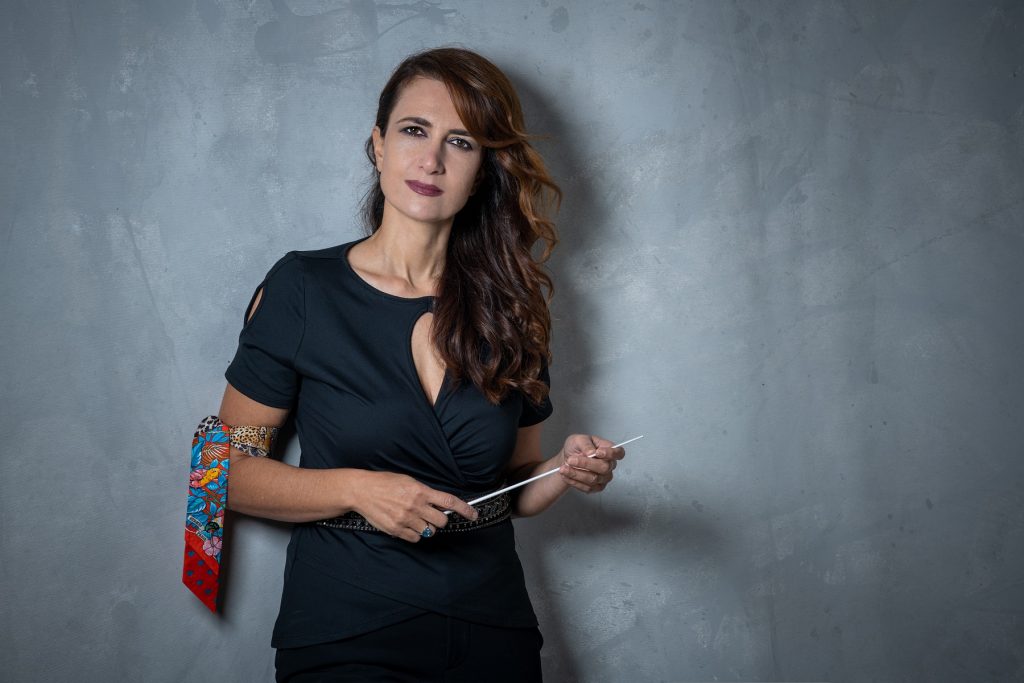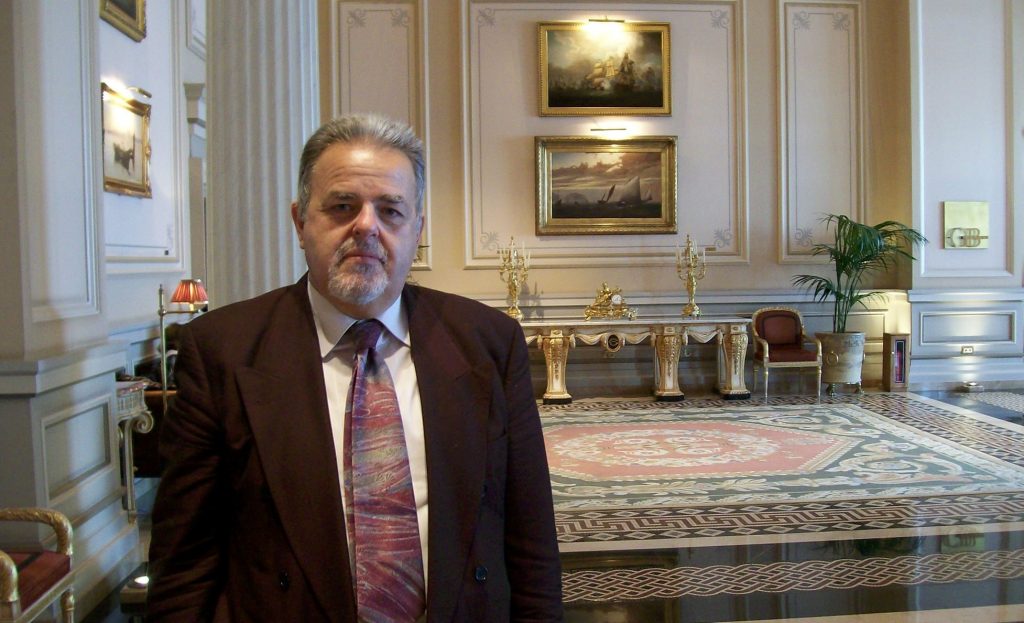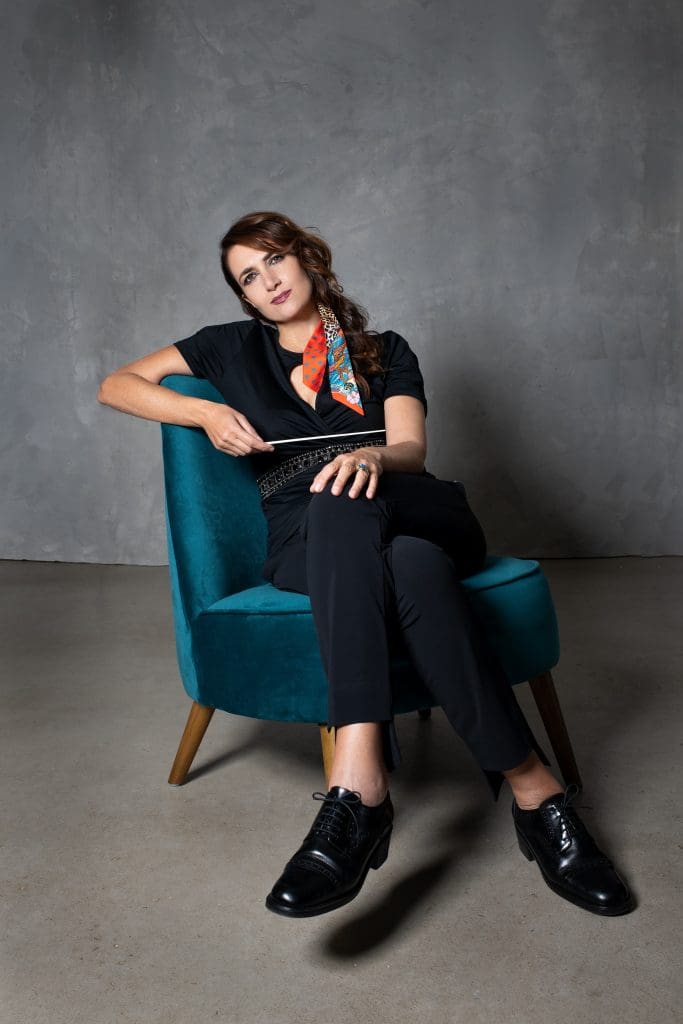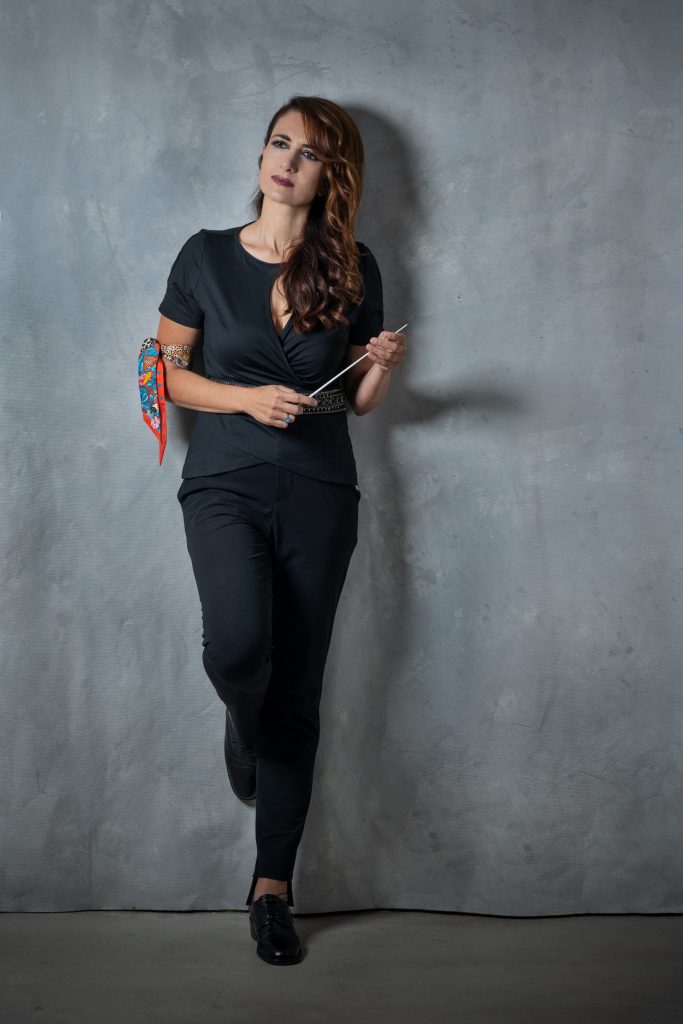Music: Maria Makraki spells it out – an interview with Achilleas Papadionyssiou

You all know that we support Arts in its entirety and Music has been one of the many issues where we dedicate a lot as well as in promoting performers all over Planet Ocean both onboard as well as ashore – log in under the respective category and you will get the message.
Never forget that on board the Cruise ships – mini or mega ones, entertainment and in particular music plays a pivotal role…
Today, we bring you an exceptional interview with a world acclaimed lady: Maria Makraki responding to an important number questions to Achilleas Papadionyssiou:

Ms Makraki, could you tell us a little bit about where you were born, your early years and your family?
I was born in Thessaloniki but my family roots are in Crete. My earliest memories are tied to music as I quickly realised I had a natural inclination that turned out to be very decisive for me. With my father, we listened daily to classical music and he encouraged all my interests and curiosities, and even introduced me to different ideas and concepts about art.
What prompted you to take up music as your main study?
I started playing the piano at the age of four as this instrument was part of my family life. I realised immediately how happy I was expressing myself and communicating through music, and I was captivated by this sense of harmony, unity and self-fulfilment. Slowly, this intellectual challenge of combining notes and sounds and transforming them into a myriad of authentic emotions became a life-long gravitational force for me.
What about your musical studies?
After graduating with Diplomas in both piano performance and compositional studies, I felt the urge to complement music with science, and this led to my completing a degree in Physics at the National and Kapodistrian University of Athens. My passion for music ‘won’, though, and I continued for further studies in orchestral conducting at the University of Arts in Berlin, under the guidance of Professor Hanns Martin Rabenstein, and then for postgraduate studies at the Hanns Eisler University of Berlin and the University of Zurich (with Professors Hans Dieter Baum and Johannes Schlaefli respectively). Among my teachers I can also include distinguished conductors such as George A. Albrecht, Andrey Boreyko, Carlo M. Giulini, Lorin Maazel, Kurt Masur, Sir Roger Norrington and Jorma Panula.

How did you combine music and science?
Throughout my studies I felt this curiosity about how the natural sciences and music shared many common parameters. Physics is part of music and music is part of physics. Sound is a natural phenomenon and harmony has structures and ratios, and at some point both systems interact with each other and become unified. In my daily interactions with orchestras I often catch myself trying to bring complex musical structures to light through this understanding of physics. It is fascinating!
Can you name some of the orchestras you have worked with?
Yes, I have happily collaborated with many orchestras in European countries such as Great Britain, Austria, Germany, Switzerland, Greece, Italy, Ukraine, Poland, Rumania, Turkey, the Czech Republic, as well as orchestras in the United States of America. More specifically, I can mention the Radio Symphony orchestras of Munich, Cologne, Stuttgart, Frankfurt, Bucharest and Athens, with which I have also made recordings. Further collaborations include the Philharmonic orchestras of Baden-Baden, Jena, Kharkov, Krakow, New Brandenburg, the Rheinische, the Robert-Schumann, the Symphonic orchestras of Berlin, Berg, Bochum, Boston, Nuremberg, Tschaikovsky, West Bohemia, and finally the National and Opera orchestras of Bremen, Bremerhaven, Chemnitz, Constanza, Giessen, Halle, Heidelberg, Kassel, Leipzig, Muenster, Pforzheim and Rostock.
What about some of the prizes and awards you have won in your career?
I have been very lucky to enjoy the support of a national scheme for young conductors called “Maestros of the Future – Maestros von Morgen” administered by the German Council for Music (Deutscher Musikrat-Dirigentenforum). Through this scheme I was given the opportunity to perform with select orchestras and to gain invaluable experience at the beginning of my career. Furthermore, in the Fifth International Conducting Competition of the Czech Republic I was awarded First Prize, and this led to important collaborations with first-rate orchestras around Europe. I also won First Prize in the Solingen competition in Germany and this led to my assuming the post of chief conductor of the Academy of the Bergische Symphony Orchestra. Finally, in the Bad Homburg international competition I won Second Prize and I was then offered a series of concerts with select orchestras in both Germany and Poland.
What about your collaboration with the Munich Radio Orchestra?
While still a student, I won a special prize in the Carl Maria von Weber competition in Munich, and this resulted in a long-term collaboration with the Rundfunk Orchester in Munich, with which I have also made a number of recordings.
You have been the leader of the Camerata Europæa since 2017, tell us a little bit about the orchestra.
After my tenure as principal conductor at the Opera of Chemnitz and the Robert Schuman Philharmonic, I assumed the position of artistic director of the Camerata Europæa, based in Berlin. By founding and leading the Camerata, essentially an orchestra for Europe, I wanted to make a contribution towards a multicultural dialogue that mirrored the fundamental cultural tenets of the EU, helping in this way to experience Europe as our common home. With three distinct and multiform ensembles based in Berlin, Innsbruck and Athens, the Camerata Europæa etches a broad arch over the European map, from north to south, eliminating frontiers and building bridges towards better cultural exchanges and a deeper understanding of the concept of Europe. We have implemented many pioneering programs that aim to inspire in audiences an awareness of the cultural treasures of Europe, while at the same time highlighting the ideals of harmony and unity that remain at the core of the European Union.

You were awarded a Doctorate in Conducting Studies by the Department of Music Science & Art at the University of Macedonia in Thessaloniki.
Yes, in the period 2007–2009 I was a principal doctoral candidate in the Conducting department of the Department of Music Science & Art in Thessaloniki. It was a great joy and honour for me to be able to contribute to the musical life of my native town, a town I love dearly.
You are considered an Ambassador of Greek Culture in Europe. Tell us a little bit about this title and what you have accomplished so far?
In 2019, I was exceptionally honoured to receive the prize “Exaleiptron” for my work in promoting Greek culture abroad, especially in the field of music. Through different activities and programs I am trying to showcase the deep richness of our country and how it has left an indelible mark on the European map and its values. It is however a difficult task, full of challenges.
What is the main focus of you work as an artist?
As the artistic director and conductor of the Camerata Europæa I mainly focus on pioneering inter-border programs that highlight the integral qualities of contemporary European classical music. I am particularly interested in crafting and developing new thematic concepts about Europe, combining music with other arts in a broader perspective of sounds and symbols, and presenting these projects in new, experimental surroundings. By conceiving themed concert cycles we aim to communicate to the pubic, in a multisensory way, the concept of “Unity through Diversity”. A further goal is to encourage a dialogue between the different European countries, aiming at a better understanding and a closer rapprochement through the universal language of music.
How common is it to see a woman maestro leading an orchestra?
Without a doubt it is not very common to see women conductors on the podium today, but with a lot of zeal, dedication and passion everything is possible; provided you are strong willed, hard working, disciplined and patient, you can slowly create the right circumstances and conditions so that your dreams and aspirations can come true.
What is the relationship between the orchestral musicians and the conductor like?
It is a relationship that blossoms through the right chemistry. An authentic approach to music accompanied by the right artistic background, a good rapport and an innate musicianship are all parameters that support this triangle between conductor, orchestra and the public, striking the right balance.
What is the one thing that you love most about your profession?
Well, I’d have to say it is this direct, unencumbered and penetrating communication with the orchestral ensemble as a live, vibrating organism, and also the whole process of transforming sound into pure sentiment, something that gives rise to strong emotions and even the elation of the soul. This is often a painstaking but fascinating procedure which, at its best, can lead to magical moments of unity.
What are the possibilities and opportunities for a woman conductor in Greece, and in relation to the other European countries?
As a country with a long tradition in classical music, Germany has certainly helped me unfold my artistic potential and given me many opportunities to advance. However, in today’s globalised world, I believe that there are no one-way-streets anymore and it is possible to create the right conditions for professional development even in Greece. Undoubtedly though, it would be beneficial for an artist to accumulate experiences and broaden one’s horizons by searching for opportunities abroad.
What are the essential qualities that every gifted conductor should have?
A conductor should possess a broad culture, psychological maturity, swift perception, technical mastery, discipline, organization skills, innate musicality, self confidence, charisma and even an aura. The qualities that go into interpreting a musical work in its total morphology, structure and plasticity – while maintaining a clear view of the whole so that it can be channelled effectively to the musicians – all create a mixture of intellectual, psychological and interpersonal attributes that have nothing to do with gender.
Have there been any deeply influential figures in your artistic career?
Yes, undoubtedly there have been many important mentors and figures that have left an indelible mark on my career, especially during my studies in Berlin; I would like to mention here Claudio Abbado, Carlos Kleiber and in general the highly structured and formally strict approach of the Herbert von Karajan school.
Do you have any thoughts about the relationship that Greeks have with classical music?
I think it all goes back to education. I believe there have been many positive developments in Greece recently, with regard to establishing music departments at universities, conservatories, specialist schools, concert halls, and generally an easy access to musical training and education. However, a more focused approach by the institutional forces could help by amplifying these structures and promoting culture, freedom of expression, respect, and generally an open mind towards diversity.
What about the role of music in pedagogy and education?
I am convinced that music training is fundamental to shaping well rounded personalities. We see it historically that in advanced societies, and already in the Antiquity, music has always formed part of the general curriculum with the broader view of raising the average spiritual level and shaping good characters according to specific virtues and values.
How were you treated during your early steps in Germany?
Germany has undoubtedly supported me fully and provided me with the perfect training for my profession. Of course, this went hand in hand with hard work, dedication, enthusiasm, discipline and a non-wavering focus. Art by definition flourishes in a pluralistic setting and Berlin is the perfect paradigm for this, a city with broad exchanges of ideas amongst its many artists.
What would you advise someone who hopes to take up music professionally?
Undoubtedly, one can find abroad, and especially in German speaking countries, a much broader spectrum of possibilities and opportunities for classical music. It would be beneficial for an artist to acquire a large spectrum of experiences and impressions which will then become the source of their future inspiration and self fulfilment on their path to maturity.
And finally, what about your future plans?
Our project themed “Odyssey”, originally planned for 2020, will now be transferred to 2021, offering the opportunity for the public to experience music and art in a multi-cultural, multi-dimensional way. My future goals include encouraging and helping the survival and mobility of European cultural institutions, as well as promoting the first performances of new works across country borders, contributing in this way to the international exposure of music creators. My plans also include new collaborations with international ensembles, while at the same time continuing as the artistic director of the European Festival of Culture and the Festival of Contemporary Music “Regain”, and bringing talented new artists to the attention of Greek and European audiences. I am also very happy to have been invited to take part in the newly founded Anargyrios and Korgialenios Music Academy in Spetses, and, furthermore, I continue to give lectures on the subject of “Leadership”.
www.mariamakraki.com
www.camerata.eu
N.B. With Thanks to Art Historian and Lecturer at the Ionian University Ms Maray Georgoussis for bringing forward this interview





